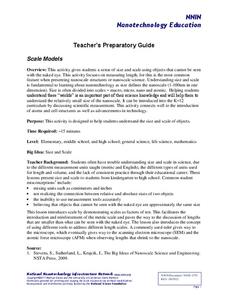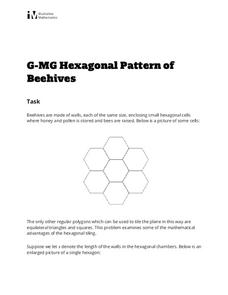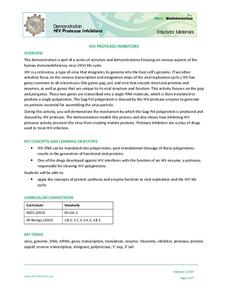Curated OER
Cell Art
Combine art and science with this cell structure assignment. Learners depict a cell diagram, including the organelles, imitating a specific artist's style.
Biology Junction
Cell Membrane Coloring Worksheet
A simple coloring activity reinforces learning of the cell membrane structure. In addition, junior biologists answer fill-in-the-blank and short-answer questions detailing the function of the cell membrane. This worksheet is five pages...
Lincoln Public Schools
Cell Exploration Activities
Engage young biologists in exploring the mysteries of life with this collection of hands-on activities. Enlisting the help of numerous digital resources, students get an up-close look at the structure of plant and animal...
Towson University
Mystery of the Crooked Cell
Can your class solve the Mystery of the Crooked Cell? Junior geneticists collaborate to learn about sickle cell anemia in a fascinating lesson plan. The included materials help them to examine the genetic factors behind the disease...
Serendip
Structure and Function of Cells, Organs and Organ Systems
Cells of different organs have unique cell functions. Learn how cell functions vary depending on their roles in the body using an inquiry-based activity. Scholars analyze the cell structure to make comparisons to its functions, allowing...
Biology Junction
Plant Cell Coloring Worksheet
In this plant worksheet, pupils define each part of the plant cell. They color and label the cell drawing and then compare and contrast plant and animal cells.
MENSA Education & Research Foundation
The Cell: the Building Blocks of Life
Do you have early finishers asking what they can do next, or any budding scientists eager to learn more about plant and animal cells? Then here is a cell unit for you! The packet provides scholars with everything they need in order...
Gallantsbiocorner.com
Cell Membrane & Transport
Young scientists demonstrate their understanding of cell transport on this comprehensive worksheet. Focusing on cellular structure and the different processes that allow materials to move into, out of, and throughout animal...
Radford University
Translating and Evaluating Cell Phone Plans
Translate phone plans to algebraic expressions. Pupils review translating verbal phrases to algebraic expressions by filling out graphic organizers and completing matching activities. Using a fictitious cell phone company, they create...
Ask a Biologist
Neuron Anatomy Activity
Reinforce the neural connections in the brains of your young biologists with a simple anatomy worksheet. Looking at the provided diagram of a neuron, students are asked to correctly identify and describe the function of...
Cornell University
Plant Cell Crime Scene
Use science to solve the mystery of the Poplar murder. Pupils use forensic botany to determine if a suspect could be the killer. By analyzing images from a Transmission Electron Microscope, learners determine if the material found on the...
Serendip
How Do Biological Organisms Use Energy?
When an organism eats, how does food become energy? Young biologists follow glucose through the process of cellular respiration to the creation of ADP using a discussion-based activity. The resource also highlights conservation of mass...
BBSRC
Discovering DNA: The Recipe for Life
A pinch of adenine, a dash of thymine and ta-da, you have life! Well, it's not quite that simple, but through this series of activities and experiments young scientists learn about the structure of DNA and how it contains the recipe...
Rice University
Biology for AP® Courses
An eight-unit electronic textbook provides a guide to AP® Biology. Each of the 28 chapters include an introduction, multiple lessons, a summary, review questions, and test prep questions. Teachers see how each lesson connects to a big...
National Nanotechnology Infrastructure Network
Scale Models
With instructions to adapt the activities for any grade K-12, any teacher can incorporate the concept of scale into the classroom with a simple, yet effective lesson.
Curated OER
Bee Pollen Popular
The world would be a much different place without the help of pollinators. Read about the important role bats, hummingbirds, and various insects play in plant reproduction, exploring the interdependence of living things in an ecosystem....
Illustrative Mathematics
Hexagonal Pattern of Beehives
Young geometers and biologists investigate the math of nature in an activity that is just the bee's knees. Participants will study the tessellations of hexagons in a beehive, along with the natural rationale behind the specific shape....
Howard Hughes Medical Institute
HIV Protease Inhibitors
How do doctors fight a virus that's constantly mutating? Show science scholars how we fight HIV using one of its own most fundamental processes through a thoughtful demonstration. The lesson focuses on how protease inhibitors prevent HIV...
American Chemical Society
The Discovery of Fullerenes
Carbon is the most common element on earth, so the innovative discovery of a new type of carbon molecule won the 1996 Nobel Prize. In the ready-to-go lesson, scholars learn about C60 and how it has opened up the entire area of...
Teach Engineering
Microfluidic Devices and Flow Rate
When you have to flow, you have to flow. The lesson plan introduces class members to microfluidic devices and their uses in medicine. They watch a short video on how the diameter affects the rate of flow. The worksheet has individuals...
Biology Junction
Fungi Coloring Worksheet
In this biology instructional activity, students complete 28 short answer questions on fungi. They color and label the different parts of a hyphae.
American Museum of Natural History
Microbes Coloring Book and Scavenger Hunt
Coloring pages showcase microbes—bacteria, viruses, and protists. Scholars have the option to download a coloring book and scavenger hunt or color the page directly on the computer. Three paragraphs describe each microbe.
Biology Junction
Bacteria Crossword Puzzle
In this biology instructional activity, high schoolers complete a crossword puzzle with 42 questions about bacteria. They identify the different characteristics of bacteria.
Department of Defense
Do Dea: Biology: Unit 3: Cell Structure
In this third unit of a Biology course, students learn about cells and cell structure. They compare prokaryotic and eukaryotic cells and learn about the specialized structures in a cell and what their functions are. They will also learn...























